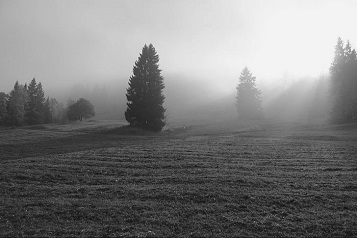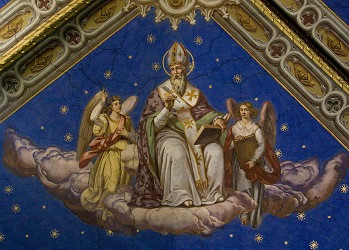The Zen Teaching of Huang Po: On the Transmission of Mind
As recorded by the scholar P'ei Hsiu of the T'ang Dynasty. Rendered into English by John Blofeld (Chu Ch'an) [Excerpts. Complete text (.pdf) HERE]
P'ei Hsiu's Preface – The great Zen Master Hsi Yun lived below the Vulture Peak on Mount Huang Po, [From which he takes his posthumous name] in the district of Kao An which forms part of the prefecture of Hung Chou [In the modern province of Kiangsi]. He was third in the direct line of descent from Hui Neng,[Wei Lang] the Sixth Patriarch, and the pupil of a fellow-disciple of Hui Hai. Holding in esteem only the intuitive method of the Highest Vehicle, which cannot be communicated in words, he taught nothing but the doctrine of the One Mind; holding that there is nothing else to teach, in that both mind and substance are void and that the chain of causation is motionless. Mind is like the sun journeying through the sky and emitting glorious light uncontaminated by the finest particle of dust. To those who have realized the nature of Reality, there is nothing old or new, and conceptions of shallowness and depth are meaningless. Those who speak of it do not attempt to explain it, establish no sects and open no doors or windows. That which is before you is it. Begin to reason about it and you will at once fall into error. Only when you have understood this will you perceive your oneness with the original Buddha-nature. Therefore his words were simple, his reasoning direct, his way of life exalted and his habits unlike the habits of other men.
Disciples hastened to him from all quarters, looking up to him as to a lofty mountain, and through their contact with him awoke to Reality. Of the crowds which flocked to see him, there were always more than a thousand with him at a time. In the second year of Hui Ch'ang (A.D. 843), when I was in charge of the district of Chung Lin, I welcomed him on his coming to that city from the mountain where he resided. We stayed together in the Lung Hsing Monastery where, day and night, I questioned him about the Way. Moreover, in the second year of T'ai Chung (A.D. 849), while governing the district of Wan Ling, I again had occasion to welcome him ceremoniously to the place where I was stationed. This time we stayed quietly at the K'ai Yuan Monastery, where also I studied under him day and night. After leaving him, I recorded what I had learnt and, though able to set down only about a fifth of it, I esteem it as a direct transmission of the Doctrine. At first I was diffident about publishing what I had written; but now, fearing that these vital and penetrating teachings will be lost to future generations, I have done so. Moreover, I gave the manuscript to the monks T'ai Chou and Fa Chien, requesting them to return to the Kuang T'ang Monastery on the old mountain land to ask the elder monks there how far it agrees with what they themselves used frequently to hear in the past.


